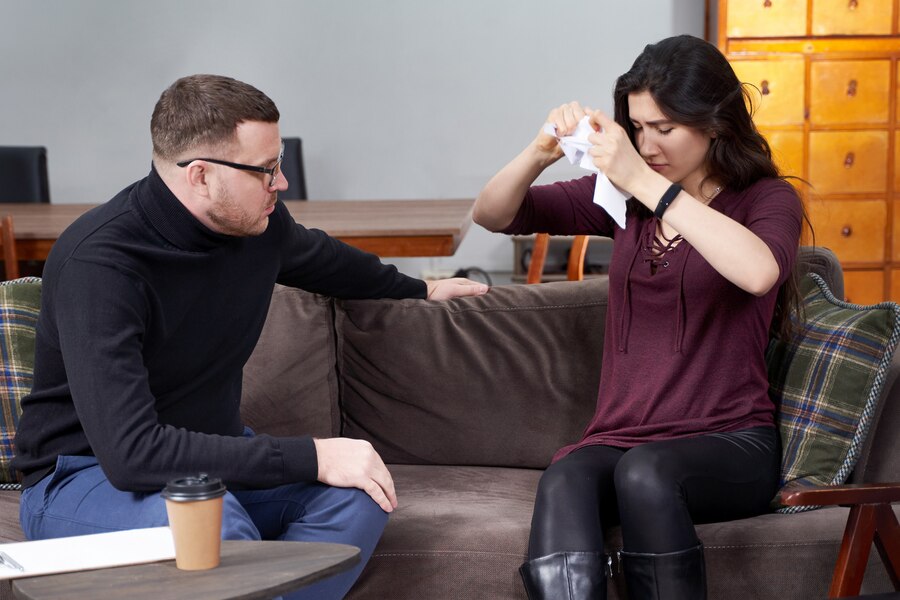Substance abuse treatment encompasses a variety of approaches designed to help individuals overcome addiction and build a healthier, more balanced life. At Couples Rehab, we understand that no single method fits all, which is why we offer a range of evidence-based treatments tailored to meet the unique needs of each client. Our goal is to provide comprehensive care that addresses both the physical and psychological aspects of addiction, supporting clients through every stage of their recovery journey.
By incorporating a combination of traditional and innovative methods, Couples Rehab aims to help individuals achieve lasting sobriety and improved overall well-being. Our treatment programs are designed to address the complexities of addiction, offering support not only to those struggling with substance abuse but also to their partners and families. Through personalized care and a holistic approach, we strive to foster a supportive environment that promotes healing and long-term success.
Understanding the Different Types of Substance Abuse Treatments
Substance abuse treatments vary widely, reflecting the diverse needs of individuals seeking recovery. Treatments typically fall into categories such as detoxification, therapy, medication, and support groups, each addressing different aspects of addiction. At Couples Rehab, we offer a range of these treatments to ensure a comprehensive approach to recovery.
- Detoxification is often the initial step in treatment, involving the process of clearing substances from the body and managing withdrawal symptoms.
- Therapeutic approaches, such as Cognitive Behavioral Therapy (CBT) and Dialectical Behavior Therapy (DBT), focus on addressing the psychological aspects of addiction and developing coping strategies. Medication-Assisted Treatment (MAT) combines medications with therapy to address substance dependence and support recovery.
- Support groups and holistic approaches further complement treatment by providing community support and integrating wellness practices into the recovery process.
Detoxification: The First Step in Recovery
Detoxification, commonly referred to as detox, is the process of removing toxic substances from the body and managing withdrawal symptoms. It is often the first step in a comprehensive substance abuse treatment program, designed to stabilize the individual physically before moving on to therapeutic interventions. Detoxification typically involves medical supervision to ensure safety and comfort during the withdrawal process.
At Couples Rehab, we provide medically supervised detox services to ensure that clients receive appropriate care and support as they begin their recovery journey. Our team of healthcare professionals is skilled in managing withdrawal symptoms and addressing any medical complications that may arise. Detoxification is a crucial step in preparing individuals for further treatment, as it helps to eliminate substances from the body and reduce cravings, allowing clients to focus on the therapeutic aspects of their recovery.
Residential vs. Outpatient Treatment Programs
Substance abuse treatment programs generally fall into two categories: residential (inpatient) and outpatient.
- Residential treatment programs require individuals to live at the treatment facility for a specified period, providing a structured and immersive environment for recovery. These programs offer 24/7 support and supervision, allowing clients to focus entirely on their treatment without external distractions.
- Outpatient treatment programs, on the other hand, allow individuals to live at home while attending therapy sessions and other treatment activities at scheduled times. Outpatient programs offer greater flexibility, making them suitable for those who have work or family responsibilities, or who have completed a residential program and are transitioning to less intensive care.
At Couples Rehab, we offer both residential and outpatient treatment options to accommodate the diverse needs of our clients. Our goal is to provide a supportive and effective treatment experience, whether clients require the intensive care of residential programs or the flexibility of outpatient services.
Cognitive Behavioral Therapy (CBT) for Substance Abuse
Cognitive Behavioral Therapy (CBT) is a widely used therapeutic approach that focuses on identifying and changing negative thought patterns and behaviors associated with substance abuse. CBT helps individuals understand the connection between their thoughts, emotions, and actions, enabling them to develop healthier coping strategies and problem-solving skills.
During CBT, clients work with a trained therapist to explore their beliefs and behaviors related to substance use. The therapy emphasizes setting realistic goals, learning new coping mechanisms, and addressing triggers that lead to substance use. By modifying unhelpful thought patterns and behaviors, CBT aims to reduce the likelihood of relapse and support long-term recovery.
At Couples Rehab, CBT is a key component of our treatment programs, offering clients practical tools and strategies to manage their addiction and improve their overall mental health. Our therapists work closely with clients to tailor CBT techniques to their individual needs, fostering a supportive environment for personal growth and recovery.
Dialectical Behavior Therapy (DBT) and Its Role in Substance Abuse Treatment
Dialectical Behavior Therapy (DBT) is another therapeutic approach used in substance abuse treatment, particularly for individuals who struggle with intense emotions and interpersonal difficulties. DBT combines cognitive-behavioral techniques with mindfulness practices and focuses on helping clients achieve a balance between acceptance and change.
In DBT, clients learn skills in four key areas: mindfulness, distress tolerance, emotion regulation, and interpersonal effectiveness. These skills help individuals manage their emotions, cope with crises, and improve their relationships. DBT is particularly beneficial for those with co-occurring mental health disorders or those who have not responded well to other treatments.
At Couples Rehab, DBT is integrated into our treatment programs to provide clients with a comprehensive approach to managing their substance abuse and emotional challenges. Our therapists use DBT to help clients build resilience, enhance emotional stability, and improve their relationship dynamics, supporting their overall recovery journey.
Medication-Assisted Treatment (MAT) and Its Benefits
Medication-Assisted Treatment (MAT) involves the use of medications in combination with therapy to treat substance use disorders. MAT aims to reduce cravings, manage withdrawal symptoms, and support recovery by addressing the neurological aspects of addiction. Medications used in MAT may include those that help normalize brain function and reduce the risk of relapse.
MAT benefits include improved retention in treatment, reduced substance use, and decreased risk of overdose. It also supports individuals in achieving better overall outcomes by addressing both the physical and psychological aspects of addiction. MAT is often used in conjunction with counseling and behavioral therapies to provide a comprehensive approach to treatment.
At Couples Rehab, we offer MAT as part of our substance abuse treatment programs, providing clients with a balanced approach that includes medication, therapy, and support. Our medical team carefully monitors and adjusts medications as needed to ensure the best possible outcomes for each client.

Motivational Interviewing: Enhancing Motivation for Change
Motivational Interviewing (MI) is a client-centered therapeutic approach designed to enhance motivation and commitment to change. MI focuses on exploring and resolving ambivalence about substance use, helping clients find their own reasons for making positive changes in their lives.
During MI sessions, therapists use open-ended questions, reflective listening, and supportive feedback to help clients explore their values and goals. The goal is to increase clients’ readiness for change and empower them to take active steps toward recovery. MI is particularly effective for individuals who are resistant to treatment or unsure about their commitment to change.
At Couples Rehab, we incorporate Motivational Interviewing into our treatment programs to support clients in overcoming barriers to change and strengthening their motivation for recovery. By fostering a collaborative and empathetic therapeutic relationship, MI helps clients build confidence and engage more fully in their treatment process.
The Role of 12-Step Programs and Support Groups
12-Step programs, such as Alcoholics Anonymous (AA) and Narcotics Anonymous (NA), are widely recognized support groups that provide a structured framework for recovery from substance abuse. These programs are based on a set of principles and steps designed to help individuals achieve and maintain sobriety.
Support groups offer a sense of community and shared experience, allowing individuals to connect with others who understand their struggles. These groups provide valuable emotional support, encouragement, and accountability, which can be crucial for maintaining long-term recovery. Participation in 12-Step programs and support groups is often recommended as part of a comprehensive treatment plan.
At Couples Rehab, we encourage participation in 12-Step programs and support groups as an integral part of our treatment approach. These programs complement our therapeutic interventions by providing additional support and fostering a sense of belonging and connection with others in recovery.
Holistic Approaches: Integrating Wellness and Recovery
Holistic approaches to substance abuse treatment focus on addressing the whole person—mind, body, and spirit—rather than just the addiction itself. These approaches often include practices such as yoga, meditation, nutritional counseling, and exercise, which can enhance overall well-being and support the recovery process.
Holistic therapies aim to improve physical health, reduce stress, and promote emotional balance, contributing to a more comprehensive recovery experience. By integrating these practices into treatment, individuals can develop a greater sense of self-awareness, build healthy habits, and achieve a more balanced lifestyle.
At Couples Rehab, we incorporate holistic approaches into our treatment programs to support clients in their journey to recovery. Our goal is to provide a well-rounded treatment experience that addresses all aspects of health and well-being, helping clients build a foundation for lasting recovery.
Family Therapy and Its Impact on Substance Abuse Treatment
Family therapy is an important component of substance abuse treatment that involves working with family members to address the impact of addiction on the family system. Family therapy aims to improve communication, resolve conflicts, and build stronger relationships within the family unit.
Family therapy can help address issues such as enabling behaviors, codependency, and communication breakdowns that may contribute to substance abuse. By involving family members in the treatment process, individuals can gain support from their loved ones and work together to create a healthier family dynamic.
At Couples Rehab, we offer family therapy as part of our comprehensive treatment programs. Our therapists work with families to provide education, support, and strategies for improving relationships and fostering a supportive environment for recovery.
Addressing Co-Occurring Mental Health Disorders
Many individuals with substance use disorders also struggle with co-occurring mental health disorders, such as depression, anxiety, or bipolar disorder. Addressing these co-occurring conditions is essential for effective treatment and long-term recovery.
Integrated treatment for co-occurring disorders involves providing care for both the substance use disorder and the mental health condition simultaneously. This approach ensures that all aspects of an individual’s health are addressed, reducing the risk of relapse and promoting overall well-being.
At Couples Rehab, we offer integrated treatment for co-occurring disorders, providing clients with comprehensive care that addresses both their substance abuse and mental health needs. Our goal is to support clients in achieving a stable and balanced recovery by addressing all facets of their health.
Relapse Prevention Strategies: Planning for Long-Term Success
Relapse prevention is a crucial aspect of substance abuse treatment, focusing on strategies to help individuals maintain their sobriety and avoid relapse. Effective relapse prevention involves identifying triggers, developing coping skills, and creating a plan for managing challenges that may arise during recovery.
Relapse prevention strategies include building a strong support network, setting achievable goals, and practicing self-care. By preparing for potential challenges and developing a proactive approach to recovery, individuals can improve their chances of long-term success and maintain their sobriety.
At Couples Rehab, we emphasize relapse prevention as a key component of our treatment programs. Our therapists work with clients to develop personalized relapse prevention plans, providing them with the tools and support needed to achieve lasting recovery.
Finding the Most Effective Methods for Substance Abuse Treatment
At Couples Rehab, we are dedicated to helping individuals and couples find the most effective methods for overcoming substance abuse and achieving long-term recovery. Our comprehensive approach includes a variety of evidence-based treatments and supportive therapies, tailored to meet the unique needs of each client.
If you or a loved one is struggling with substance abuse, we invite you to reach out to us to learn more about our treatment programs and how we can support your journey to recovery. Our team is here to provide compassionate care and guidance every step of the way.
FAQs
What are the primary methods of substance abuse treatment? Common methods include detoxification, behavioral therapies, medication-assisted treatment, and holistic therapies.
What is detoxification, and how does it help in substance abuse recovery? Detoxification is the process of medically managing withdrawal symptoms to safely reduce dependence on substances. It’s often the first step in treatment.
What are some common behavioral therapies used in substance abuse treatment? Behavioral therapies, such as cognitive-behavioral therapy (CBT) and dialectical behavior therapy (DBT), help individuals identify and change unhealthy behaviors associated with substance abuse.
How does medication-assisted treatment (MAT) work for substance abuse? MAT combines medication with behavioral therapies to manage withdrawal symptoms, reduce cravings, and prevent relapse.
What are some holistic therapies used in substance abuse treatment? Holistic therapies, like yoga, meditation, and acupuncture, focus on addressing the whole person, including physical, mental, and emotional well-being.
Is a combination of treatment methods effective for substance abuse recovery? Often, a combination of treatment methods, tailored to individual needs, can provide the best outcomes.
How long does substance abuse treatment typically last? The duration of treatment varies depending on the individual’s needs, substance, and severity of addiction. It can range from a few weeks to several months.
What is the role of aftercare in substance abuse treatment? Aftercare involves ongoing support and resources to help individuals maintain sobriety and prevent relapse. It may include therapy, support groups, and medication management.
Can substance abuse treatment be effective for individuals with co-occurring disorders? Yes, many treatment programs address both substance abuse and mental health conditions, providing integrated care.
How can I find a substance abuse treatment program that meets my specific needs? Research programs, consider factors like location, cost, insurance coverage, and treatment modalities. Reading reviews and seeking recommendations can also be helpful.








